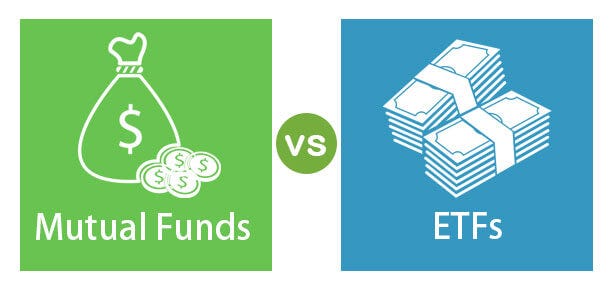ETFS Vs Mutual Fund: An Ultimate Guide

When it comes to investing in the stock market, there are various investment vehicles available to investors. Two of the most popular options are mutual funds and exchange-traded funds (ETFs). Both of these investment vehicles provide investors with an opportunity to diversify their portfolios while potentially generating returns. However, there are some key differences between the two that investors should consider before making their investment decisions.
What are mutual funds?
A mutual fund is an investment vehicle that pools money from various investors to purchase a diversified portfolio of stocks, bonds, or other assets. The fund is managed by a professional fund manager who decides which securities to buy and sell within the fund based on the fund's investment objective. Investors in a mutual fund own shares in the fund and are entitled to a portion of the fund's returns.
One of the key benefits of investing in a mutual fund is that it provides diversification. By investing in a mutual fund, investors gain exposure to a wide range of securities, which helps to reduce risk. Mutual funds also offer professional management, which can be particularly beneficial for investors who do not have the time or expertise to manage their own investments.
What are ETFs?
An ETF is similar to a mutual fund in that it is a pooled investment vehicle that provides investors with exposure to a diversified portfolio of securities. However, there are some key differences between the two. Unlike mutual funds, which are priced once a day at the end of trading, ETFs trade like stocks throughout the day. This means that investors can buy and sell ETFs at any time during market hours, which can be particularly appealing for active traders.
Another key difference between mutual funds and ETFs is the way they are structured. While mutual funds are bought and sold directly from the fund company, ETFs are bought and sold on a stock exchange. This means that investors in ETFs typically pay a brokerage commission, whereas investors in mutual funds do not.
ETFs also tend to have lower expense ratios than mutual funds. Expense ratios are the fees charged by the fund company to manage the fund. Since ETFs are passively managed, they tend to have lower expenses than actively managed mutual funds.
Which is better for investors?
Both mutual funds and ETFs offer investors an opportunity to diversify their portfolios while potentially generating returns. However, the choice between the two will depend on an investor's individual goals and preferences.
For investors who are looking for a long-term investment option and do not want to be actively involved in managing their investments, mutual funds may be a good choice. Mutual funds offer professional management and provide diversification, which can be particularly beneficial for investors who are just starting out.
On the other hand, ETFs may be a better choice for investors who are looking for more flexibility and control over their investments. Since ETFs trade like stocks, they can be bought and sold throughout the day, which can be appealing for active traders. Additionally, ETFs tend to have lower expense ratios than mutual funds, which can help investors keep more of their returns.
In conclusion, both mutual funds and ETFs have their advantages and disadvantages. Investors should carefully consider their individual goals and preferences before deciding which investment vehicle is right for them. By doing so, they can create a diversified portfolio that helps them achieve their long-term financial goals.
Business d'Or is a place of motivation for the business world. They are making the world's most influential leaders and entrepreneurs who are driving change, remodeling organizations and developing a big impact on the world.
Let's Start A New Journey with Business d'Or — Share Your Successes.